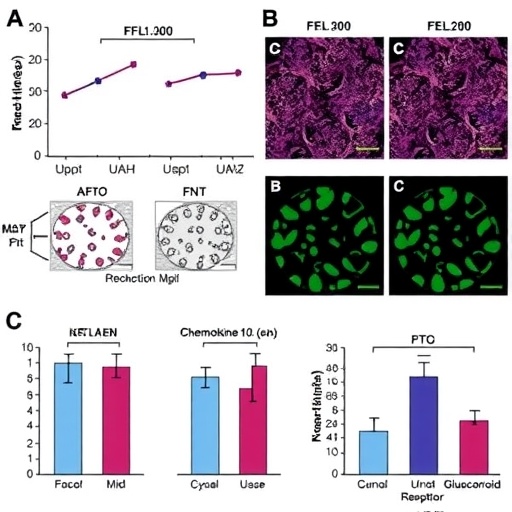In a groundbreaking study poised to reshape therapeutic approaches in multiple myeloma, researchers at the VIB-UGent Center for Medical Biotechnology have unveiled a novel strategy to overcome drug resistance by targeting a critical protein that modulates the cancer cells’ response to glucocorticoid therapy. This discovery, recently published in the prestigious journal Pharmacological Research, sheds new light on molecular mechanisms driving treatment failure and offers a beacon of hope for patients facing the daunting challenge of refractory disease.
Multiple myeloma (MM) is a hematological malignancy characterized by the clonal proliferation of plasma cells within the bone marrow microenvironment. Despite advances in treatment modalities, including proteasome inhibitors and immunomodulatory drugs, glucocorticoids such as dexamethasone remain a cornerstone in managing MM due to their potent anti-inflammatory and anti-proliferative effects. Unfortunately, the clinical efficacy of dexamethasone is frequently undermined as the disease evolves, with many patients developing resistance that significantly limits therapeutic outcomes and contributes to disease relapse.
Central to this resistance phenomenon, the researchers have identified the chemokine receptor CCR1 as a pivotal player. CCR1 functions as a transmembrane G protein-coupled receptor prominently expressed on the surface of myeloma cells. It mediates cellular responses to chemokine gradients within the bone marrow, influencing cancer cell survival, proliferation, and migration. By conducting comprehensive molecular analyses, the team correlated elevated CCR1 expression levels with poorer prognostic profiles in MM patients, particularly those experiencing disease progression and diminished responsiveness to glucocorticoid treatment.
To translate this insight into a clinically actionable strategy, the team employed BX471, a selective CCR1 antagonist known to impede receptor signaling. Treatment with BX471 re-sensitized multiple myeloma cells that had acquired glucocorticoid resistance, facilitating the induction of programmed cell death or apoptosis. Mechanistically, this combination therapy disrupted key resistance-associated proteins, thereby dismantling the cellular defenses that often shield malignant cells from chemotherapeutic agents.
Professor Karolien De Bosscher, a senior investigator on the study, emphasized the significance of these findings, stating that targeting CCR1 represents a promising avenue to counteract one of the most formidable obstacles in MM therapy. By reprogramming resistant cancer cells to respond to existing drugs, CCR1 inhibition could markedly improve patient outcomes and extend the clinical benefits of standard treatments.
The implications of this research extend beyond mere proof of concept. It paves the way for the rational design of combination regimens incorporating CCR1 inhibitors with glucocorticoids, potentially mitigating the emergent resistance that complicates long-term disease management. Given the complexity of the bone marrow microenvironment and its influence on tumor behavior, modulating CCR1 activity could also disrupt the supportive niche that fosters myeloma cell survival and propagation.
Although the preclinical data are highly encouraging, the researchers caution that extensive clinical validation is requisite to determine the safety, efficacy, and optimal dosing schedules for CCR1-targeted therapies in humans. Future trials will be essential to assess the translational potential of this approach and to explore whether CCR1 inhibition can synergize with other frontline or emerging myeloma treatments for maximum therapeutic benefit.
This study exemplifies the critical role of targeted molecular research in advancing cancer care. By dissecting the interplay between chemokine signaling and drug resistance mechanisms, the team contributes to a burgeoning field aimed at precision oncology, where treatments are tailored to circumvent specific molecular barriers within the tumor milieu.
In conclusion, the identification of CCR1 as a modulatory axis in glucocorticoid resistance opens a promising chapter in multiple myeloma therapy. The strategic blockade of this receptor may transform treatment paradigms and provide renewed hope for patients whose disease has historically been refractory to glucocorticoids. As research progresses toward clinical application, the oncology community eagerly anticipates the integration of CCR1 inhibitors into multimodal therapeutic regimens.
Subject of Research:
CCR1 inhibition as a strategy to overcome glucocorticoid resistance in multiple myeloma cells.
Article Title:
CCR1 inhibition sensitizes multiple myeloma cells to glucocorticoid therapy
News Publication Date:
23-Mar-2025
Web References:
http://dx.doi.org/10.1016/j.phrs.2025.107709
Keywords:
Multiple myeloma, Cancer treatments, Glucocorticoids, Chemokine receptors
Tags: bone marrow microenvironment in myelomacancer cell survival factorsCCR1 chemokine receptordexamethasone efficacy enhancementglucocorticoid resistance mechanismshematological malignancies treatmentmultiple myeloma therapyovercoming drug resistance strategiespharmacological research advancementsrefractory disease managementVIB-UGent research findings





